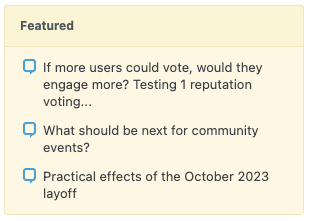Community managers are conflicted advocates
Stack Overflow lost a good one in Catija
There’s an art to reading company announcements. Take this one from Stack Overflow. Underneath all the puffery, the message is simple:
- Business is terrible.
- Tacking on “AI” didn’t help.
- In order to avoid taking even bigger loses, the company is cutting expenses by laying off good people.
One of the “approximately 28%” laid off today was Catija. I was one of the interviewers when she was hired and one of my interview questions was something along the lines of:
Describe your favorite feature on our sites.
I literally didn’t care about the answer1 but I wanted to know if the person I was interviewing understood how the site operates. It also sparked conversations such as how downvotes encourage empathy or whether a question sandbox would reduce the need to close questions.
But all of that was a prelude to my real question:
What would happen if that feature needed to be removed? What problems would that cause?
When I interviewed Catija, her favorite feature was voting,2 so I asked what would happen if downvoting were removed. My focus was on this angle because whenever someone came to the company without previous Stack Exchange experience, they’d have questions why we allow downvotes. One of these days someone will finally get their way and eliminate downvotes. When that time come, they will want someone like Catija on the team.
I didn’t ask this question to be a jerk, but because being a community management means advocating for the company. It’s a tiny bit like being a defense attorney where you gotta fight for the best outcome for your client whether or not they are guilty. Companies make dumb decisions sometimes and a community manager might be called on to communicate their decisions. A good community manager finds the best way to deliver bad news. An exceptional community manager pushes back so that the company can achieve its goals without destroying the trust of the community.
Catija’s answers to my interview questions showed she had the capacity to be exceptional at the role. Her performance on the job demonstrated her growing excellence as a community manager. Her last project for Stack Exchange Inc. is still featured on Meta Stack Exchange:

She wasn’t advocating for the removal of downvotes, but for removing the reputation requirement for voting. It’s a radical idea. The moderators heard about it before the decision that ignited the moderator strike so they started waiting for it to be announced too. On Meta Discord server this potential change was labeled “the second shoe”. So you can imagine how unpopular the idea was going to be. Catija pushed back and advocated for a slower experiment designed to test the concept without breaking a bunch of communities all at once. It’s worth trying, though I wonder who will champion it now.
Companies routinely undervalue community management because they can’t properly value community trust. That’s because executives never seem to remember that people can just decide to leave. Or just as bad, forget to come one day. It’s like John Bull (@garius) wrote:
Users and readers will stick to what they know, and use, well beyond the point where they start to lose trust in it. And you won’t see that. But they’ll only move when they hit the Trust Thermocline. The point where their lack of trust in the product to meet their needs, and the emotional investment they’d made in it, have finally been outweighed by the physical and emotional effort required to abandon it.
For those of you who have forgotten their oceanography, the thermocline is the depth where the sun’s radiation can’t reach to heat the water. Temperature stays steady enough as you go deeper until it falls rapidly in the thermocline:
By analogy, communities can lose trust for a while without any obvious effect. But that doesn’t mean there’s no limit. So this is an awkward situation where there’s no apparent downside to neglecting a community until there very much is a downside. People like Catija can detect problems far sooner than anyone else and take action to build up trust before it’s lost forever. That’s when the job shifts to advocating for the community with the company.
Or maybe it’s always a balance between the two going back and forth to make sure each side has a better understanding of the other today than they had yesterday. And meanwhile both community and company change and grow and drift so there’s never a fixed point. No fixed point except for people who Catija who make it their mission to understand the community. Stack Overflow doesn’t know it yet, but they will miss Catija in time.
As long as it’s not the “thanks” reaction!↩︎
This and editing are the two most common answers I got. They are great features and I wasn’t looking for novelty here. ;-)↩︎
